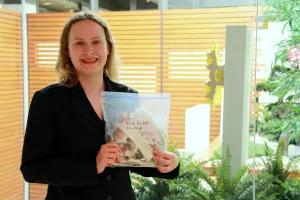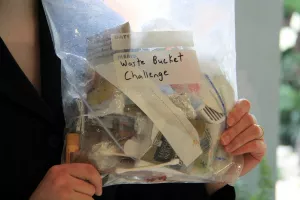
UTM’s environmental sustainability coordinator takes up the Waste Bucket Challenge
If you’ve run into Chelsea Dalton recently, you might have noticed that’s she’s toting an unusual accessory. Since the beginning of February, Dalton has been collecting her personal trash in a large Ziploc bag.
Dalton has been participating in the Waste Bucket Challenge, a trash-reduction initiative that originated on the chat boards of the Ontario College and University Sustainability Professionals, where Dalton is a board member. Like last year’s viral Ice Bucket Challenge, participants are tagged and challenged to collect all of the waste they produce that is destined for landfills—compost or recyclable material doesn’t count towards the total. At the end of the week, new participants are tagged to continue the challenge.
The Waste Bucket Challenge is a natural fit for Dalton, who is the environmental sustainability coordinator with UTM’s facilities management and planning department. She works on programs that make the university more sustainable with initiatives like the campus BikeShare program, and supervises the UTM Green Team and the Green Ambassadors volunteer program.
“I thought it was a great idea,” Dalton says. In fact, she liked the challenge enough to continue beyond the initial seven days, and will track her trash for the entire month of February.
Dalton is already conscious of the waste she produces—she recycles and composts regularly—but she was still surprised by the amount of trash she generated during the Waste Bucket Challenge. “This is harder than I thought it would be,” she says.
She diligently brings home paper napkins from restaurants so she can stash them in her home compost bin, and tucks the cellophane from a fortune cookie into her trash bag. She also checks wheredoesitgo.ca to see what goes into the garbage, and what can be diverted into recycling and composting bins.

“You really have to think ahead,” she notes. “I have to remember to ask waitresses not to put a straw in my drink.”
Thanks to the challenge, Dalton has shifted her buying habits. One of the biggest items in her waste bucket is the butcher paper wrapper from a beef roast, so Dalton has cut back on her meat consumption. She has also stopped buying individually wrapped tea bags, and goes without a hot drink if she forgets to bring her reusable mug on coffee runs. “My husband asked me if I wanted chocolates for Valentine’s Day, and I said “No,” because the greaseproof paper can’t be recycled.”
Dalton plans to complete the challenge at the end of February, but says that she will stick with some of the tricks she’s learned over the past few weeks, like buying foods in bulk, remembering her reusable mug, avoiding takeout food and cutting back on individually wrapped goods.
Like last summer’s Ice Bucket Challenge, the Waste Bucket Challenge is passed forward. Dalton has challenged UTM’s Green Ambassadors, the executives of the Student Association for Geography and the Environment and pal Mandy Perreira to track their trash.
